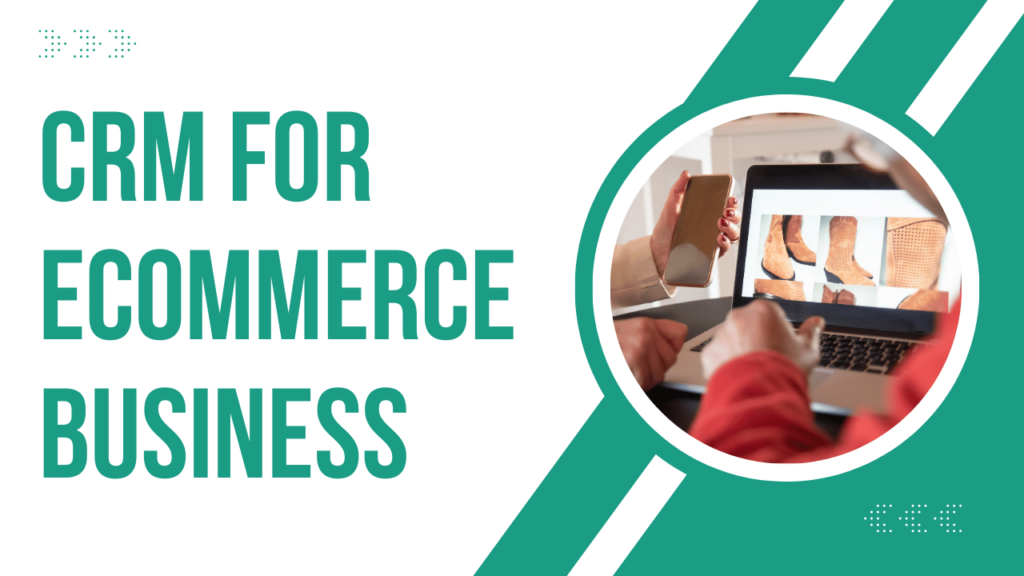Did you know that businesses using a CRM system experience a 29% increase in sales?
In today’s hyper-competitive marketplace, understanding and managing customer relationships is more critical than ever. As an ecommerce business, leveraging the right Customer Relationship Management (CRM) system can be the difference between stagnation and exponential growth. In this comprehensive guide, I’ll delve into the Best CRM for ecommerce business, comparing top solutions tailored to meet your unique needs.
Why Selecting the Right CRM Matters
Choosing the right CRM isn’t just about managing customer data; it’s about driving business success through enhanced customer retention, streamlined operations, and data-driven decision-making. A robust CRM system can transform your ecommerce operations, offering insights that lead to better customer experiences and increased sales.
In this article, we’ll explore the key features to look for in a CRM for your business, review the top CRM solutions available today, and provide actionable steps to help you choose the best CRM for your ecommerce needs. Whether you’re a small startup or a large enterprise, this guide will equip you with the knowledge to make an informed decision.
What to Look for in a CRM for Your Business
Scalability
As your ecommerce business grows, so do your customer interactions and data. A scalable CRM system can accommodate increasing data volumes and user demands without compromising performance. It’s essential to choose a CRM that can grow with your business, offering advanced features and integrations as needed.
Ease of Use
An intuitive interface and a straightforward onboarding process are crucial, especially for small teams or those new to CRM systems. A user-friendly CRM ensures that your team can quickly adapt and utilize the system effectively, minimizing downtime and maximizing productivity.
Customization
Every ecommerce business has unique workflows and requirements. The ability to customize your CRM’s features and functionalities allows you to tailor the system to your specific needs, ensuring that it supports your business processes seamlessly.
6 Best CRM Solutions for Ecommerce Business
Selecting the Best CRM for ecommerce business depends on your specific needs, budget, and business size. Here are six top CRM solutions that stand out in the ecommerce landscape:
1. HubSpot CRM
HubSpot is an all-in-one CRM solution designed for scaling businesses. It offers comprehensive tools for marketing, sales, customer service, and content management. Known for its user-friendly interface, HubSpot integrates seamlessly with various platforms, making it popular for eCommerce businesses looking to streamline customer interaction and boost sales.
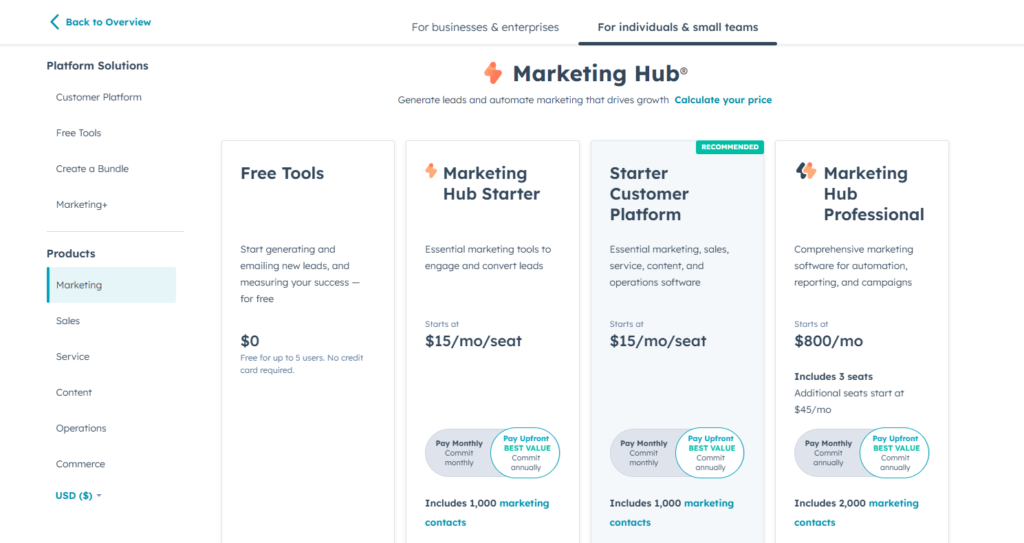
Key Features:
- Contact Management: Centralizes all customer data for better engagement.
- Email Marketing & Automation: Create personalized campaigns, track performance, and automate workflows.
- Lead & Pipeline Management: Easily manage leads, track sales processes, and forecast revenue.
- Analytics & Reporting: Offers detailed insights on sales, marketing performance, and customer interactions.
- Live Chat & Chatbots: Engages customers in real time, improving customer service and boosting conversions.
- Integration with eCommerce Platforms: Connects to Shopify, WooCommerce, etc., to track sales, cart activity, and customer interactions.
Pricing:
- Free Plan: $0 for core features.
- Starter: $15/month.
- Professional: $800/month.
- Enterprise: $3,600/month.
Small to medium eCommerce businesses looking for a scalable, integrated CRM with marketing automation and analytics capabilities. Ideal for businesses that need a user-friendly platform with comprehensive tools for growing customer relationships.
2. Pipedrive CRM
Pipedrive is a sales-focused CRM designed to help businesses manage and streamline their sales pipeline. Known for its simplicity and intuitive design, Pipedrive enables teams to prioritize tasks, close more deals, and automate repetitive processes. It’s particularly useful for eCommerce businesses that rely heavily on efficient sales tracking and management.
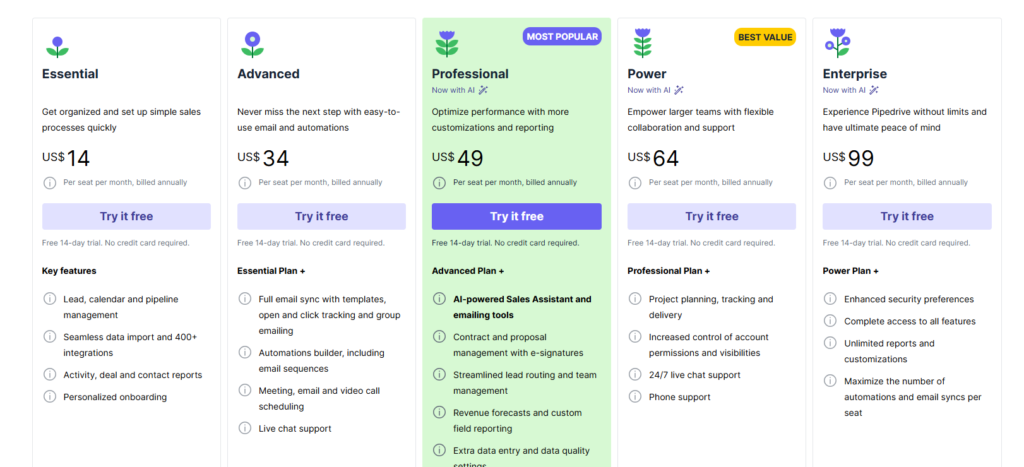
Key Features:
- Sales Pipeline Management: Visual pipeline to track deals from start to finish, helping businesses stay organized and focused.
- Activity Tracking: Monitors sales activities, calls, emails, and meetings, ensuring no task or follow-up is missed.
- Automation & Workflow: Automates tasks like follow-ups, lead assignments, and deal progression to save time.
- Customizable Reports & Dashboards: Provides insights into sales performance, helping businesses optimize their processes.
- Lead & Deal Management: Manages leads efficiently, enabling teams to capture, nurture, and convert them into paying customers.
- Integrations: Seamlessly connects with eCommerce platforms like Shopify, as well as email marketing tools and apps.
Pricing:
- Essential Plan: $14/month per user.
- Advanced Plan: $34/month per user.
- Professional Plan: $49/month per user.
- Power Plan: $64/month per user.
- Enterprise Plan: $99/month per user.
Small to mid-sized eCommerce businesses focused on streamlining their sales processes. Ideal for businesses with a dedicated sales team that needs clear visibility into the sales pipeline and automation for repetitive tasks.
3. Salesforce CRM
Salesforce is one of the most powerful and widely-used CRMs in the world, designed for businesses of all sizes. It offers a comprehensive suite of tools to manage customer relationships, automate processes, and analyze data, making it a top choice for eCommerce businesses looking for advanced customization and scalability.
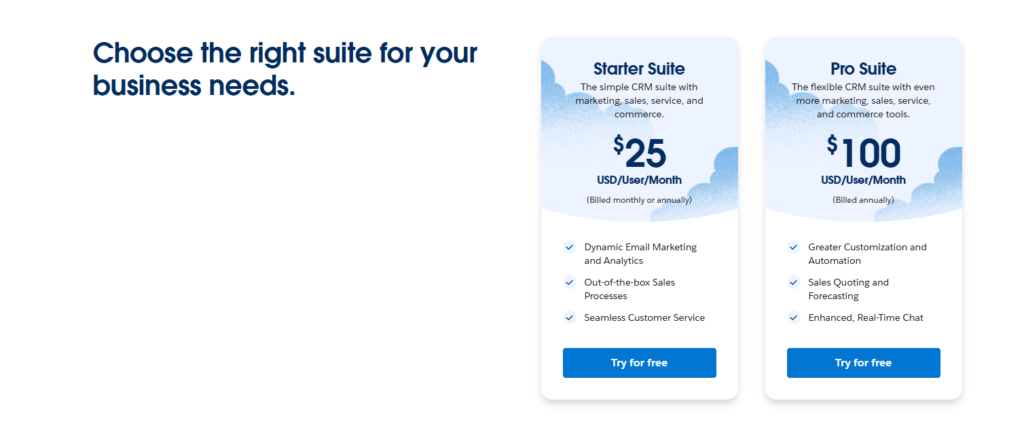
Key Features:
- Sales Cloud: Manages sales processes, leads, and opportunities, helping businesses track and close deals efficiently.
- Marketing Cloud: Delivers personalized marketing campaigns across multiple channels, improving customer engagement and retention.
- eCommerce Integration: Seamlessly connects with platforms like Shopify and Magento to manage orders, inventory, and customer data.
- Customer Service Management: Includes tools for customer support, such as live chat, help desk, and case management, enhancing the customer experience.
- Analytics & Reporting: Provides deep insights into sales, customer behavior, and marketing performance through customizable reports and dashboards.
- Automation & AI (Einstein AI): Automates repetitive tasks, and uses AI to predict trends, optimize marketing, and improve sales processes.
Pricing:
Salesforce’s pricing varies widely based on business size and needs, typically starting at around $25 per user per month and going up to $300+ for advanced features and enterprise solutions.
Large or rapidly growing eCommerce businesses that need a fully customizable CRM with advanced automation, deep analytics, and integration capabilities. Best for businesses looking to scale with complex sales and marketing processes.
4. Keap CRM
Keap is an all-in-one CRM and marketing automation tool tailored for small businesses, particularly in the eCommerce space. It helps manage customer relationships, automate marketing and sales, and streamline day-to-day operations. Keap is known for its ease of use and focus on helping businesses grow through better customer management and marketing automation.
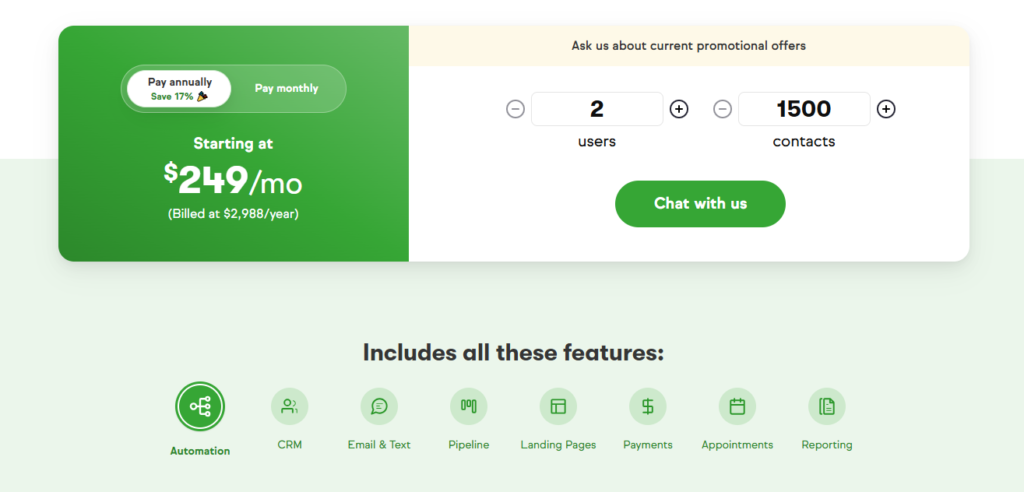
Key Features:
- Email Marketing & Automation: Automates follow-ups, cart abandonment emails, and other communication, improving conversion rates.
- E-Commerce Integration: Integrates with popular platforms like Shopify and WooCommerce for order and inventory management.
- Lead Capture & Nurturing: Automatically captures leads from forms and emails, nurturing them through personalized follow-ups.
- Invoicing & Payments: Generates invoices and collects payments seamlessly, making transactions easier for eCommerce businesses.
- Sales Pipeline: Tracks leads, deals, and sales processes, ensuring sales teams stay organized and close more deals.
- Appointment Scheduling: Automates customer booking and follow-up, reducing manual scheduling tasks.
Pricing:
- $249/month for 1,500 contacts and 2 users.
Small to medium eCommerce businesses that need marketing automation, sales pipeline management, and eCommerce integrations. Ideal for businesses looking to automate repetitive tasks and enhance customer engagement without needing a complex CRM.
5. Zoho CRM
Zoho CRM is a cloud-based platform offering a wide range of tools for sales automation, marketing, and customer service. It’s highly customizable, affordable, and integrates seamlessly with other Zoho products, making it a strong choice for eCommerce businesses looking for an all-in-one CRM solution.
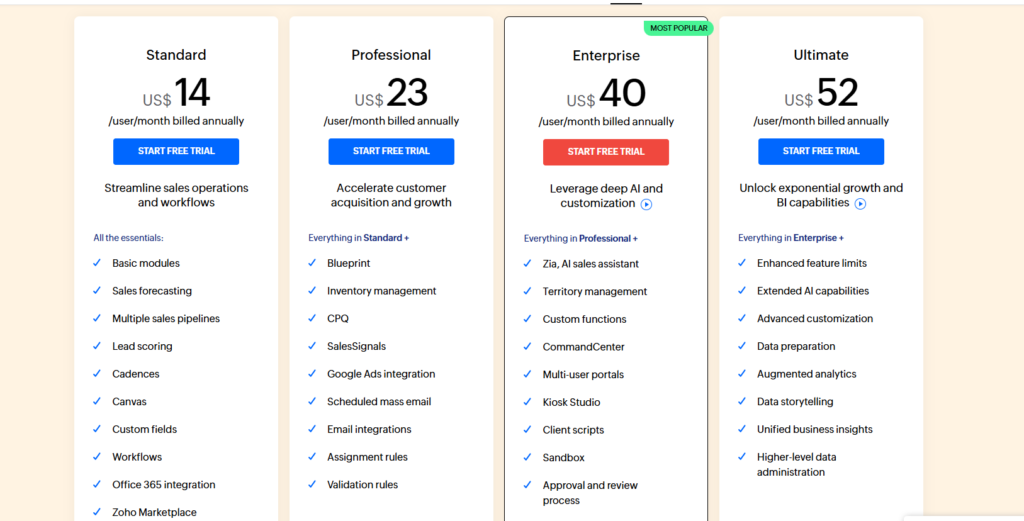
Key Features:
- Sales Automation: Automates lead management, tracking, and sales processes to help eCommerce businesses focus on conversions.
- Omnichannel Communication: Centralizes email, phone, live chat, and social media interactions, ensuring consistent customer engagement.
- AI-Powered Insights (Zia): AI-driven analytics provide predictions, trends, and automated workflows, optimizing marketing and sales efforts.
- Customization: Offers custom modules, fields, and workflows, allowing businesses to tailor the CRM to their specific processes.
- E-commerce Integrations: Integrates with popular platforms like Shopify, WooCommerce, and third-party tools for order and customer management.
- Analytics & Reporting: Real-time dashboards and reports give insights into sales performance, customer behaviors, and marketing effectiveness.
Pricing:
Pricing starts at around $20 per user per month for basic features, with higher plans for more advanced features and customization options.
Small to medium eCommerce businesses that require a customizable and affordable CRM solution. Ideal for companies looking for automation, omnichannel communication, and AI-powered analytics.
Which CRM is Best for Your Ecommerce Business?
After evaluating these CRM solutions based on scalability, ease of use, customization, and specific ecommerce features, HubSpot CRM emerges as a standout choice for many ecommerce businesses. Its robust feature set, seamless integrations, and user-friendly interface make it a versatile option for businesses of all sizes.
Use Case Recommendations
- Small to Medium Enterprises (SMEs): Zoho CRM offers affordability and flexibility, making it ideal for growing businesses looking to scale without breaking the bank.
- Large Enterprises: Salesforce Commerce Cloud provides extensive customization and powerful analytics, suitable for large businesses with complex needs.
- Shopify Users: Shopify CRM integrates seamlessly with Shopify stores, offering tailored features that enhance ecommerce operations.
- Email Marketing Focus: Klaviyo excels in email marketing automation, perfect for businesses prioritizing personalized customer communication.
Ready to enhance your ecommerce operations with a top-tier CRM? Start by exploring free trials or scheduling demos with the recommended CRM providers. Assess how each system aligns with your business needs and take the first step towards transforming your customer relationships.
How to Choose a CRM: A Beginner’s Buying Guide for Ecommerce Business
Selecting the right CRM can seem daunting, especially if you’re new to the concept. Here’s a step-by-step guide to help you navigate the process:
- Identify Your Business Needs: Determine what you need from a CRM. Are you looking to improve customer service, enhance sales tracking, or streamline marketing efforts?
- Evaluate Key Features: Look for essential features such as contact management, sales automation, marketing integration, and analytics.
- Consider Your Budget: CRM systems vary in price. Assess your budget and consider the ROI a CRM can bring to your business.
- Assess Scalability: Ensure the CRM can grow with your business, offering advanced features and integrations as needed.
- Check Integration Capabilities: Your CRM should integrate seamlessly with your existing tools and platforms, such as your ecommerce platform, email marketing software, and analytics tools.
- Review Customer Support: Reliable customer support is crucial for resolving issues quickly and ensuring smooth operations.
- Take Advantage of Free Trials: Most CRM providers offer free trials. Use this opportunity to test the system’s functionality and usability before making a commitment.
Conclusion
Selecting the best CRM for ecommerce business is a pivotal decision that can significantly impact your business’s growth and customer satisfaction. By understanding your business needs, evaluating key features, and considering scalability and ease of use, you can choose a CRM that not only meets your current requirements but also supports your long-term goals.
Remember, the right CRM is an investment in your business’s future, providing the tools and insights needed to foster strong customer relationships and drive sustained growth. Take the time to explore your options, leverage free trials, and choose a CRM that aligns with your vision for success.
When choosing a CRM, think beyond immediate needs and consider how the system will support your business’s evolution. Prioritize flexibility, robust features, and excellent support to ensure your CRM remains a valuable asset as your ecommerce business scales.
Explore the CRMs mentioned in this guide and find the perfect fit for your ecommerce business. Start your free trial today and experience firsthand how the right CRM can transform your customer relationships and drive sales growth.
FAQs
Do I really need a CRM?
Yes, a CRM system is essential for managing customer relationships effectively, streamlining operations, and driving sales growth. It centralizes customer data, enhances communication, and provides valuable insights that help you make informed business decisions.
How secure is my data in a CRM?
Most reputable CRM providers implement robust security measures, including data encryption, regular backups, and compliance with data protection regulations. It’s important to choose a CRM that prioritizes data security and offers features like user access controls and secure data storage.
Can a CRM integrate with my existing tools?
Absolutely. Many CRM systems offer seamless integrations with popular ecommerce platforms, email marketing tools, analytics software, and more. Before choosing a CRM, ensure it can integrate with the tools you currently use to maintain a smooth workflow.
What is the cost of implementing a CRM system?
The cost of a CRM system varies widely based on factors such as features, number of users, and level of customization. Some CRMs offer free tiers or scalable pricing models, making them accessible for businesses of all sizes. It’s important to evaluate the potential ROI to determine the best fit for your budget.
How long does it take to set up a CRM?
Setup time depends on the complexity of the CRM and the size of your business. Simple CRMs can be up and running within a few hours, while more complex systems may take several weeks to fully implement and customize. Utilizing onboarding support and training resources can expedite the process.
What are the key features to look for in a CRM for ecommerce?
Essential features include contact management, sales automation, marketing integration, analytics and reporting, customer support tools, and seamless integrations with your ecommerce platform and other tools.
Can a CRM help improve customer retention?
Yes, a CRM helps improve customer retention by providing insights into customer behavior, enabling personalized communication, and ensuring timely follow-ups. By understanding your customers better, you can address their needs more effectively and foster long-term loyalty.
Is a CRM suitable for small businesses?
Absolutely. Many CRMs are designed with small businesses in mind, offering affordable pricing, ease of use, and essential features that help manage customer relationships without overwhelming resources.
How does a CRM enhance sales?
A CRM enhances sales by automating sales processes, tracking customer interactions, and providing valuable insights into sales performance. It helps sales teams manage leads more effectively, prioritize opportunities, and close deals faster.
What should I consider when customizing a CRM?
When customizing a CRM, consider your specific business workflows, the features you need, and how the customization will support your operations. Ensure that the CRM remains user-friendly and that customizations don’t complicate the system unnecessarily.
By following this guide, you’re well on your way to selecting the Best CRM for ecommerce business that aligns with your goals and drives your business forward. Invest time in researching and testing CRM solutions to find the perfect match for your unique needs.
I’m Rejaul Karim, an SEO and CRM expert with a passion for helping small businesses grow online. I specialize in boosting search engine rankings and streamlining customer relationship management to make your business run smoothly. Whether it's improving your online visibility or finding better ways to connect with your clients, I'm here to provide simple, effective solutions tailored to your needs. Let's take your business to the next level!

